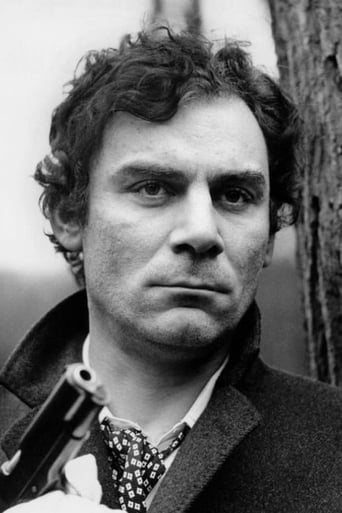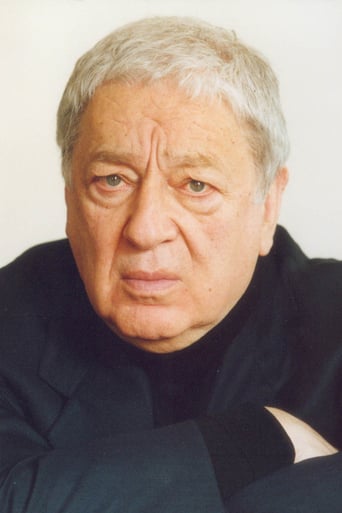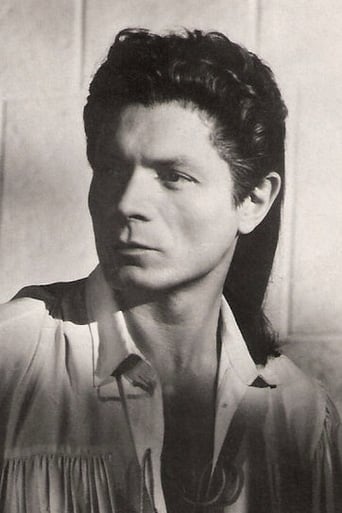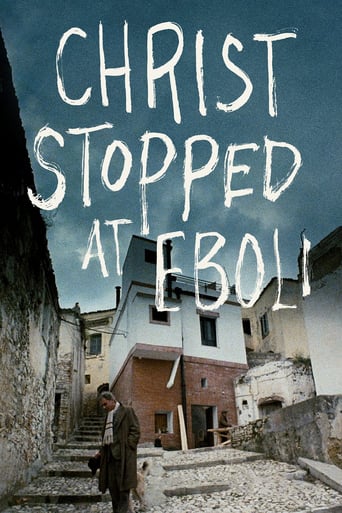
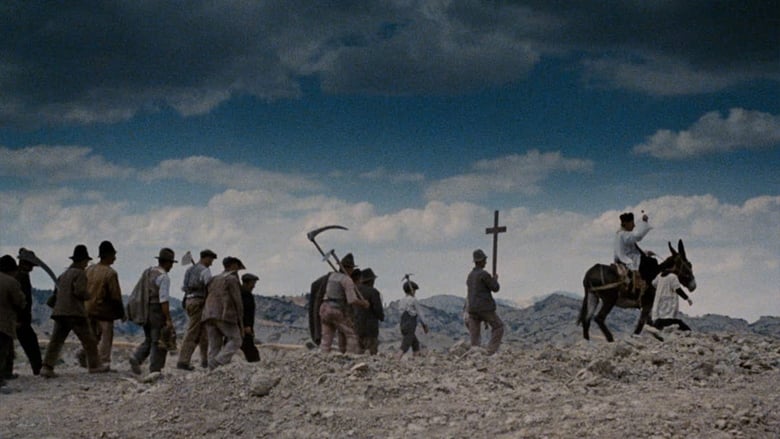
Christ Stopped at Eboli (1979)
In the fascist Italy of 1935, a painter trained as a doctor is exiled to a remote region near Eboli. Over time, he learns to appreciate the beauty and wisdom of the peasants, and to overcome his isolation.
Watch Trailer
Cast
Reviews
Wonderful Movie
Touches You
Excellent, Without a doubt!!
It's entirely possible that sending the audience out feeling lousy was intentional
1997:Checking some videos that my dad had recently brought,I spotted a double video of a wonderfully looking film.Opening the case,I was disappointed to find that the set only contained the second Video.2014:With having spent over 10 years trying to track a DVD/video version of the title,I decided to ask a DVD seller,who to my surprise revealed that he had recently gotten hold of the film! This led to me excitingly getting ready to finally pay a visit to Eboli.The plot:Italy 1935:Speaking out against the fascist regime of Italy,painter/doctor Carlo Levi is punished by the government ,by being put on a train which takes him (and dozens of other "trouble makers") to an isolated rural village on the south side of Italy,miles away from the wheels of power based in the north of the country.Arriving in the village,Levi is greeted by Mayor Don Luigi Magalone,who politely tells Levi that he must register his name every day,and that he is not allowed to take part in any "sub verse" activities.While Levi initially finds himself longing to get back home,Levi soon finds himself becoming increasingly fascinated with the poor life style that the villagers are living,which would have been completely alien to him in the big cities.View on the film:Adapting Carlo Levi's (who would end up unsuccessfully running for the Senate as an independent communist in the 1963 elections)autobiography over a 200 minute running time (good to see they kept things short & sweet!) the screenplay by writer/ (along with Tonino Guerra and Raffaele La Capria)director Francesco Rosi disappointingly never fully expresses the passage of time that the movie attempts to cover,with the progression of Levi's relationship with the villages being one which progresses in sudden bursts,rather than a more gradual,natural pace.Separating the 200 minutes as 4 TV episodes,the writers go into a superb amount of detail into the daily struggle that people in the south of Italy face,with every change in tax and the withdrawal of doctors that the government makes turning the village into a waste land which is on a completely different planet to the mighty Rome.Creating a mysterious atmosphere,Rosi and cinematographer Pasqualino De Santis brilliantly use over-saturated colours to display the almost otherworldly landscape that Levi finds himself surrounded by,which is revealed in expertly handled wide-shots.As Levi starts to become friends with the village residences,Rosi heats up the colours into warm blues & yellows which show the warmth that has built up between Levi and the towns people.Stealing every scene that he's in, Paolo Bonacelli gives a tremendous performance as fascist mayor Don Luigi Magalone,with Bonacelli giving Magalone a bumbling kick as he finds himself getting out smarted in every direction by Levi.Perfectly expressing Levi's initial uncomfortable feelings over stepping out of his comfort zone, Gian Maria Volonté gives a striking,subtle performance as Levi,with Gian Maria Volonté injecting Levi's voice with a real sense of gravitas,as he finds himself getting deeply involved with a community,from what was previously an unknown land.
this movie did more than any other Italian film i've seen to interest me in italy itself--the people, the land, the culture. it also opened my mind to the intelligence of the uneducated among us--i loved that guilia was so real and right-n and so full of peasant superstition that in no way interfered with her ability to "get it." i have begun to travel in italy and having seen this film i am driven to see the south and visit the carlo levi house and museum. his paintings see into the object, to me, like a quality black and white study which i find the most expressive medium. as soon as i see the faces in the beginning of this film, i am drawn in. i found the melancholy music somewhat sentimental (like the music in truffaut's films) but a necessary comfort.
Carlo Levi, an Italian who fought against the arrival of Fascism in his native Torino, was arrested for his activities and sent to exile in the Lucania region of the country, now known as Basilicata. The hill town of Gagliano was to be his home for the time he had to serve. This was the Italy of the 1930s where the rise of Mussolini and his quest for conquering Ethiopia, an ill conceived idea from the start.We watch as Dr. Levi arrives at the Eboli station, where he must change to a local train and a taxi in order to reach the hill town, which was also the home of other political prisoners. Right after Levi descends from his train at Eboli, he sees Barone, a dog that has been abandoned and who will become his companion in exile. His arrival in Gagliano causes curiosity among the local folk, who see in him a cultured man who sticks out. Carlo Levi observes the people as he takes his daily walks. He can't help but notice how backward everyone seems to him. At the same time, he gets to appreciate them because even if they are ignorant of the outside world, they are genuine.Levi, who had training as a physician, receives a visit from his sister Luisa, a doctor herself. He comments on the primitive state of medicine in the town, a place that boasts two doctors, who are ineffective and set in their ways. Levi clashes with the mayor, a man who is a devout follower of Mussolini and his movement, because the way he wants to censor his communication with friends. After he receives his release, Levi is not prepared for the way he made his presence felt among the locals who come to see him off.Francesco Rosi, who adapted Carlo Levi's novel, is a director with a strong sense of political awareness. He presents the figure of Carlo Levi as a noble man who was helpless against what he wanted to do for the people of Gagliano, but the local government was not exactly enthusiastic about his meddling in the local affairs. Where he is able to connect with the populace is with his knowledge of medicine. Carlo Levi also painted the people of the region.Gian Maria Volonte was an actor of quiet intensity. He is in almost all the scenes and he expresses a rage with his eyes. Mr. Volonte was the main reason for watching the film. Since he had collaborated with Rosi before, it seemed logical he would portray Carlo Levi in the movies, something that he does with ease and elegance. Others in the film include Lea Massari, as Luisa, Irene Papas as Giuglia, Alain Cluny as the Barone Nicola Rotondo. A favorable impression is made by Paolo Bonacelli, who appears as the mayor Luigi Magalone, who even when censoring Levi showed a lot of respect for him.The actual filming was done in Aliano, an ancient hill town, where the real Carlo Levi went to live after the war. Pasqualino DeSantis, the cinematographer, captured in vivid images the picturesque town, the countryside and the people of this lost city. Francesco Rosi made an interesting film about a man of principle that will live forever.
This dutiful, detailed three-and-a-half TV epic describes the exile of dissident intellectual Carlo Levi in a remote village of fascist Italy, blighted by poverty, disease, immirgration and governmental contempt. The film is part-character study, part-socio-historico-political analysis, part careful representation of a people and its place. It is seriously flawed (the people are sentimentalised, the politics are simplistic, the pleasant presentation (music, major actors, cinematography etc.) works against the horrifiic subject matter); but there are nice ironies too, such as the Christlike Levi capable of the fascism he deplores.The film can be seen in two contexts, as a neo-realist riposte to the prominent anti-realist 70s films about Fascism ('The Spider's Strategem', 'The Conformist', 'Amarcord'), and as a prestigious historical epic on a national theme frequent in the 70s and 80s ('The Travelling Players', 'Heimat'). In both cases it falls short.
